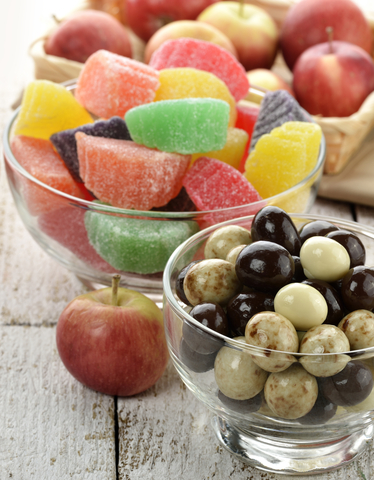August 17th, 2016

Now that you have braces, it is more important than ever to maintain good oral hygiene during your treatment, as Dr. Jimmy Glenos will tell you. While we trust you will continue brushing and flossing on a regular basis throughout your treatment at Smiles by Glenos, you also have to mindful of what you eat. While all those sweet, sour, and sticky candies may taste great, these treats can actually damage your teeth and braces!
Sour candies can be acidic to your teeth, and actually wear down the enamel that protects them, resulting in tooth decay and cavities. If you do indulge in eating these candies at some point during your treatment, be sure to wash your mouth out with water, drink milk or eat a few slices of cheese. These foods will help neutralize the acid in your mouth.
Besides cavities and tooth decay, many people do not realize that good oral health and hygiene are important to your overall health, too; researchers have discovered the connection between periodontal disease and other major health concerns, such as heart disease. Therefore, it is important to maintain a good oral hygiene routine just as you did before your braces. This includes visiting your dentist here in St. Johns or St. Augustine, FL every six months, brushing and flossing daily, and using an antibacterial mouthwash, as well as visiting Dr. Jimmy Glenos for your regular adjustment appointments.
For more questions about foods you should avoid while wearing braces, or if you have any general questions about your treatment, we encourage you to give us a call, ask us at your next adjustment appointment or ask us on Facebook!
August 10th, 2016

Bad breath, or halitosis, is probably not a matter of life or death. But it can make you feel self-conscious and have a negative impact on your life. The majority of people suffering from bad breath are dealing with oral bacterial. However, there are other causes of this embarrassing problem. Learning more can help you fight this solvable problem.
Five Causes of Embarrassingly Bad Breath
- Dry Mouth. A decrease in saliva flow can be caused by several things. Most often, medication or mouth breathing are the culprits. As saliva helps wash away food particles from your mouth, it prevents bad breath. Dry mouth can be dealt with by stimulating salivation.
- Gum Disease and Poor Oral Hygiene. Not brushing and flossing well enough or with enough frequency can lead to gum disease, which leads to bad breath. Halitosis can be a sign that plaque is present on your teeth.
- Food-Related Bad Breath. Food particles that aren't brushed or flossed away attract bacteria that leads to bad breath. It's especially important to brush after eating strong-smelling foods, such as garlic or onions.
- Smoking and Tobacco. Tobacco is bad for your health, and that includes your oral health. Smoking or chewing tobacco can contribute toward the development of gum disease, as well as oral cancer.
- Mouth Infections and Other Medical Problems. A mouth infection, sinus infection or even the common cold can cause you to temporarily have bad breath. Even conditions such as diabetes and reflux can cause halitosis. It's always wise to see Dr. Jimmy Glenos to help determine the cause.
We are Your Ally
Even if you maintain good oral hygiene, it's important to see Dr. Jimmy Glenos at our St. Johns or St. Augustine, FL office to deal with or avoid problems with bad breath. We can help you uncover the cause of halitosis, while also providing solutions that allow you to enjoy fresh breath without relying on mints and breath fresheners. As is the case with all things related to oral health, we are your number-one ally when it comes to eliminating the problem of bad breath.
August 3rd, 2016

Now that many of the schools in St. Johns or St. Augustine, FL are back in session, Dr. Jimmy Glenos would like to remind all of our patients about the importance of scheduling appointments in advance. With school, clubs, sports, and family duties to consider, we know that it can be challenging to find time to visit Smiles by Glenos this fall. In order to accommodate all of our patients’ busy schedules, it is important that you plan ahead for your appointments so that we are able to provide you with a convenient appointment time.
As always, please remember to give us advanced notice if you’re unable to make your regularly scheduled appointment with Dr. Jimmy Glenos and our team. Feel free to give us a call if you have any questions, or if you would like to schedule your fall appointment.
We’ll see you soon and hope summer is winding down nicely for you and your family!
July 27th, 2016

Water picks, sometimes called “oral irrigators,” make an excellent addition to your regular home care regimen of brushing and flossing. Especially helpful to those who suffer from periodontal disease and those patients of ours undergoing orthodontic treatment with full-bracketed braces, water picks use powerful tiny bursts of water to dislodge food scraps, bacteria, and other debris nestled in the crevices of your mouth. Children undergoing orthodontic treatment may find using a water pick is beneficial if their toothbrush bristles tend to get caught on their wires or brackets.
When you use a water pick, you’re not only dislodging any particles or debris and bacteria you might have missed when brushing, you are also gently massaging the gums, which helps promote blood flow in the gums and keeps them healthy. While water picks are an excellent addition to your daily fight against gingivitis and other periodontal diseases, they are incapable of fully removing plaque, which is why Dr. Jimmy Glenos and our team at Smiles by Glenos want to remind you to keep brushing and flossing every day.
If you have sensitive teeth or gums and find it uncomfortable to floss daily, water picks are a good alternative to reduce discomfort while effectively cleaning between teeth. Diabetics sometimes prefer water picks to flossing because they don't cause bleeding of the gums, which can be a problem with floss. If you have a permanent bridge, crowns, or other dental restoration, you may find that a water pick helps you keep the area around the restorations clean.
So how do you choose the right water pick?
Water picks are available for home or portable use. The home versions tend to be larger and use standard electrical outlets, while portable models use batteries. Aside from the size difference, they work in the same manner, both using pulsating water streams. A more crucial difference between water picks is the ability to adjust the pressure. Most home models will let you choose from several pressure settings, depending on how sensitive your teeth and gums are. Most portable models have only one pressure setting. If you want to use mouthwash or a dental rinse in your water pick, check the label first; some models suggest using water only.
Please give us a call at our St. Johns or St. Augustine, FL office if you have any questions about water picks, or ask Dr. Jimmy Glenos during your next visit!




